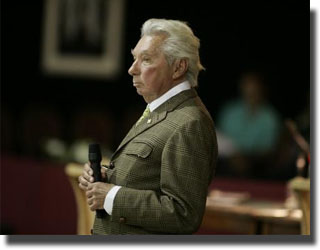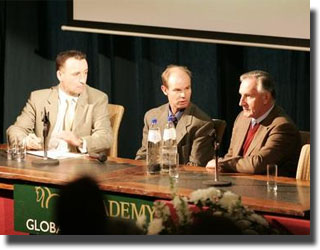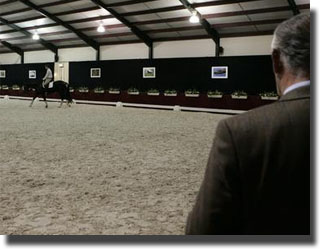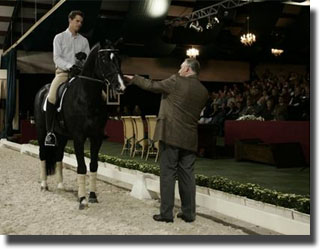|
2005
Global Dressage Forum
The Theoderscu's on Balance, Balkenhol on Relaxation
 After quite a dry lecture by Volker Moritz, the
350 guests of the GDF were eager to see an equine in
action. Monica and Georg Theodorescu were the first
to give a practical demonstration in the beautiful
set up indoor arena of Tineke and Joep Bartels' Horse
Academy. With drapes on the wall and ceiling
and lovely flowers hanging off the kickboards, the
37 x 17 m arena was intimate and cozy for the GDF demonstrations. After quite a dry lecture by Volker Moritz, the
350 guests of the GDF were eager to see an equine in
action. Monica and Georg Theodorescu were the first
to give a practical demonstration in the beautiful
set up indoor arena of Tineke and Joep Bartels' Horse
Academy. With drapes on the wall and ceiling
and lovely flowers hanging off the kickboards, the
37 x 17 m arena was intimate and cozy for the GDF demonstrations.
The 80-year old Georg Theodorescu is a legendary dressage
trainer and he announced himself as a man who needs
to use few words to communicate with his daughter ("My
daughter knows what I
want
to say") and he put this non-verbosity into practice
at the forum. It was great
pity
that
Mr Theodorescu
lacked eloquence and speed in his talk when he
tried to explain his training principles, but the man
remained witty in his remarks. "A horse needs balance,
especially in the half passes. You don't want him to
cross his legs like an epileptic," he joked.
 The subject
of the Theodorescu session was balance and Monica
brought the 7-year old chestnut gelding Whisper
(by
Welt Hit
I)
as superb example of rhythm, cadence, and balance.
The chestnut gelding moves like a metronome with so
much rhythm and spring. The subject
of the Theodorescu session was balance and Monica
brought the 7-year old chestnut gelding Whisper
(by
Welt Hit
I)
as superb example of rhythm, cadence, and balance.
The chestnut gelding moves like a metronome with so
much rhythm and spring.
Wearing a headset, Monica
explained that she developed strength and
balance in her horse by riding many voltes in the corners
and serpentines, changing leads often to supple the
horse on both sides. Georg said that the horse's forehand
is naturally heavier than the hindquarters because
the horse's head and neck, as well as the rider, are
carried in front. The horse needs to muscle up the
hindquarters to be able to take over the weight and
lift the withers.
 Klaus Balkenhol, who is the United States Dressage
Team Trainer, was the only guest speaker at the forum
he did not make the effort to speak English and brought
Volker Bromman as his interpreter. Klaus Balkenhol, who is the United States Dressage
Team Trainer, was the only guest speaker at the forum
he did not make the effort to speak English and brought
Volker Bromman as his interpreter.
Balkenhol
was invited to talk about classical training with young horses
and he stated that the training
of a horse starts with foals, who have to get used
to humans. Mistakes made in that stage can lead
to great problems later on. He looked at two 2,5 year
old horses presented in hand, analyzing the conformation
and their walk and trot. He stressed that young horses
(3 and 4-year olds) should not be trained as dressage
horses, but approached as versatile riding horses by hacking
them, taking them cross country and making them jump
small fences.
 As practical example, Balkenhol brought the 2002 Hanoverian
Licensing Champion His Highness (by Hohenstein x Donnerhall),
who has been breeding much this 2005 show season, but
has been focused on sport again this summer.
"It takes about three weeks to get his mind off breeding
and fixed on riding," Klaus said, adding that
"the best dressage stallion is a gelding. Most riders
can't handle such strong personalities. If a stallion
is just used as a dressage horse, it's better to geld
them." His Highness, on the other hand, mainly makes
his living as a breeding stallion and is slowly being
trained to FEI level. As practical example, Balkenhol brought the 2002 Hanoverian
Licensing Champion His Highness (by Hohenstein x Donnerhall),
who has been breeding much this 2005 show season, but
has been focused on sport again this summer.
"It takes about three weeks to get his mind off breeding
and fixed on riding," Klaus said, adding that
"the best dressage stallion is a gelding. Most riders
can't handle such strong personalities. If a stallion
is just used as a dressage horse, it's better to geld
them." His Highness, on the other hand, mainly makes
his living as a breeding stallion and is slowly being
trained to FEI level.
 The black stallion moved with remarkable relaxation
and looseness in his body, easily stretching into the
bit without losing purity in his paces. He was a lovely example of a young horse being worked
in the correct way without being tense or stressing out in his work.
However, what I would liked to have seen was Balkenhol
work horses that have not been trained by him for several
years. He should have showed his techniques for creating
harmony and relaxation in horses strange to him. That
would have been a real test and and intriguing demonstration. The black stallion moved with remarkable relaxation
and looseness in his body, easily stretching into the
bit without losing purity in his paces. He was a lovely example of a young horse being worked
in the correct way without being tense or stressing out in his work.
However, what I would liked to have seen was Balkenhol
work horses that have not been trained by him for several
years. He should have showed his techniques for creating
harmony and relaxation in horses strange to him. That
would have been a real test and and intriguing demonstration.
Text
copyrighted Astrid
Appels/Eurodressage.com, Images copyrighted Dirk
Caremans -
No Reproduction allowed without explicit permission
Back
on Page / Index / Next
Page of the Report
|
